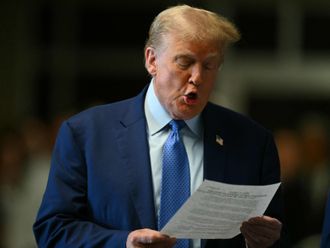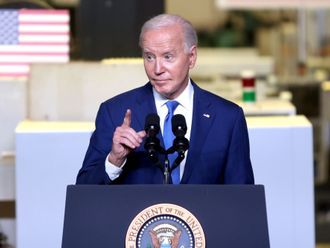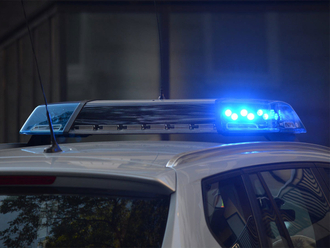Bogota: American photographer Spencer Tunick, famous for his pictures of huge crowds of naked people, is not a fan of Donald Trump.
In fact, when the presumptive Republican presidential nominee travels to Cleveland next month for the party’s convention, Tunick plans to greet him with 100 nude women holding up mirrors in a form of art photography-turned-protest.
“There shouldn’t be a rhetoric of hate in a presidential election,” Tunick, 49, said of the billionaire tycoon’s campaign, which has featured virulent diatribes against Mexicans, Arabs and women journalists, among others.
Speaking in Colombia, where he plans to assemble 4,000 naked people Sunday in what he calls a message of “peace and unity”, Tunick said he felt a duty as a husband and father of two daughters to speak out against Trump.
“I can’t just vote. I have to do something,” he told AFP.
“I think every artist in the US should make an artwork before the election and get it out there.”
His plan is to line up 100 nude women at sunrise on July 17, the day before the Republican national convention starts, wielding mirrored discs to capture the blinding light of the sun — and expose what he calls The Donald’s misguided policies.
Volunteers can sign up online to pose for the shoot, which the artist says will take place on private property near the arena.
Seemingly unstoppable
“Republicans, Democrats and all other political parties are welcome to take part,” says the website.
“It’s an artwork, not so much a protest but an action to heat up the city … [and] show that women have power,” Tunick said.
“Women in the city should look themselves in the mirror, and mirrors should shine back at them and they should see the language of hate that is coming from the Republican party.”
Tunick accused the GOP, whose leadership long resisted the seemingly unstoppable Trump nomination, of “heading backwards” on women’s and minority rights.
The New York-based photographer, who has completed major installations around the world, is in Colombia as the conflict-torn country closes in on a peace deal between the government and the Revolutionary Armed Forces of Colombia (Farc).
An honour
“It’s an honour to be here at this moment when life is changing and hopefully a peace agreement will be signed,” he said.
Tunick said his Bogota installation — the largest he has done in six years — would feature unclothed Colombians sprawled out across a government square at different elevations.
He said the aim was “to work with the body as an art object as opposed to an object of crime or violence, just show the body as a beautiful organic entity that transforms the space, the governmental space of the square”.
The Colombia conflict, which began in the aftermath of a peasant uprising in the 1960s, has killed 260,000 people and uprooted 6.6 million over more than half a century.
In this diverse country with deep inequalities and roots in Europe, Africa and the Americas, Tunick said he was hoping his photo shoot would attract “an alphabet soup of skin tonalities, ethnicities, people from all walks of life”.











